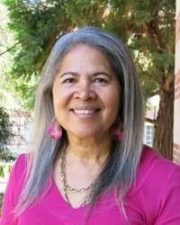Professor of Education and Information Studies, UCLA


Kimberley Gomez’ work has been centered in examining teachers’ and students’ development and use of literate practices in formal and informal contexts. She views the investigation and support of literate practices as a foundational area of inquiry because of its singularly important role in providing access to educational opportunity, and supporting equitable achievement and attainment outcomes. She employs the design and study of literate practices to enhance learning in mathematics, science, and technology use with an aim of informing theoretical and practical understandings. Broadly speaking, literate practices, here, refer to the disciplined use of language in reading, writing, and talking to engage in effective inquiry and analysis with complex expository text. She approaches inquiry into literate practices as a learning scientist. This means that she places context at the center of the design of learning environments (tools, routines and interventions). And, she views context as the primary lens in understanding the development of experiences and outcomes associated with learning. A corollary of this commitment is that she designs educational interventions and professional development opportunities in a collaborative and participatory manner working side-by-side with teachers and other frontline practitioners.
She belongs to a small, but growing, group of researchers in the nation who have been involved in long-term, sustained efforts to deeply understand the contribution of literate practices to science and mathematics education at the pedagogical and curricular levels. From the literacy perspective, she focuses on the structural, semantic, and pragmatic features of language, and how an appreciation of those features allows learners to gain access to the content as well as how skillful awareness, and use, of such features characterizes expert readers and complex communicators. From the science and math education perspectives, she attends to the role that these features of language play in helping learners acquire mathematics and science content. As such, her focus on literate practices provides a means for supporting instructors’ ability to recognize the language and literacy skills that students bring to bear when learning content, as support for facilitating students’ access to mathematics and science content and as tools and routines for quickly gauging what students understand and can represent through discourse (e.g., writing). She collaboratively designs interventions with practitioners to support teaching and learning.
Gomez received the Ph.D. from the University of Chicago in 1994. She served as a post-doctoral fellow and a research associate in the Learning Technologies in Urban Schools (LeTUS) NSF-funded study at Northwestern, in Northwestern University’s , Learning Sciences program. Gomez has been a tenured faculty member at University of Illinois at Chicago, the University of Pittsburgh, and is currently an Associate Professor of Education at the University of California, Los Angeles (UCLA). She is jointly appointed in the Information Studies department at UCLA. Since 2011, Gomez has been the lead language and literacy fellow at the Carnegie Foundation for the Advancement of Teaching. She is an Osher Fellowship recipient (awarded by the Exploratorium). She is a Sudikoff Family Institute for Education & New Media fellow (2013-14) and received the Harold A. and Lois Haytin Faculty Award, from Graduate School of Education & Information Studies, UCLA for her collaborative work with practitioners. She is the author of 47 refereed journal articles, book chapters, and conference proceeding articles. She also recently published a blog in the Huffington Post and an essay in the Center for International Relations’ International Affairs Online Forum.